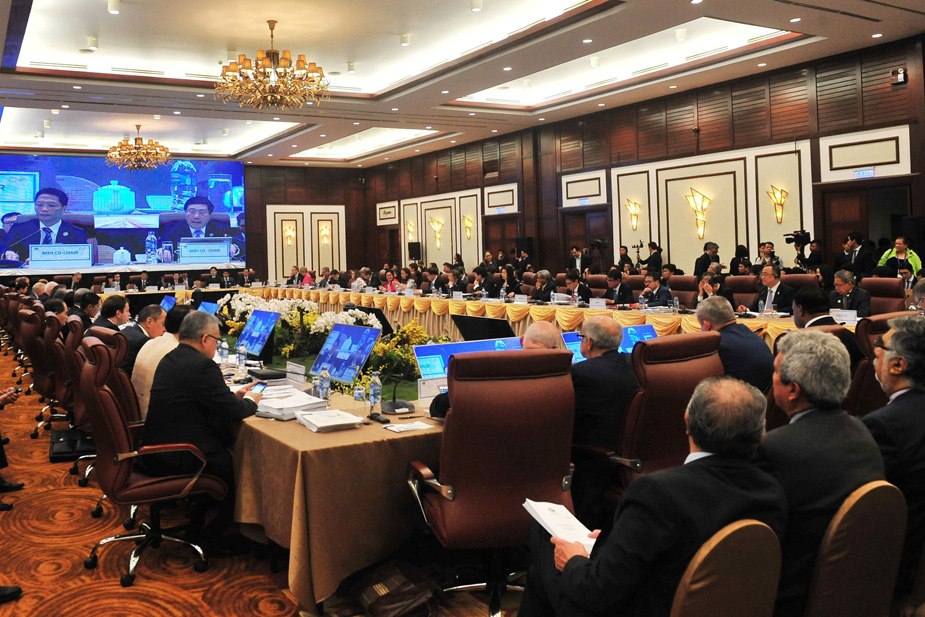Apec must continue to adapt, transform and lead—ministers

Photo from www.apec.org
Ministers from the 21 APEC member economies have convened in Da Nang to discuss advancing Asia-Pacific integration and trade in the pursuit of a sustained and inclusive economic recovery in a changing world.
Ministers are working to build on progress achieved through APEC, the world’s largest trading and growth corridor, to confront rapid and complex developments in the global landscape that are having increasingly profound implications on people’s lives and livelihoods across the region, according to a press release issued by the 29th APEC Ministerial Meeting (AMM) at the end of its first working day yesterday.
“The fourth industrial revolution has created hopes for higher productivity but also anxiety about its transformative implications,” said Vietnam Deputy Prime Minister and Foreign Minister Pham Binh Minh, Co-Chair of the 29th AMM.
“International cooperation and integration endeavors continue to be enforced but threats posed by regional tensions, terrorism, inequality, natural disasters and cyber security are becoming more acute.”
“This past year has once again proved APEC’s incredible ability to adapt, transform and to lead,” continued Minh. “APEC continues to ensure that Asia-Pacific remains an engine for global economic growth and integration for the benefit of our peoples and our businesses.”
Deputy Prime Minister Minh underscored the importance of greater action in APEC, whose economies account for half of global trade and 60 per cent of world GDP, to build new, digitally enabled growth drivers. This includes expanding support for work forces so they are equipped to thrive amid increasing automation, market competition and changing skills demands.
“We have set creating new dynamism, fostering a shared future as our aim,” Deputy Prime Minister Minh noted.
Ministers are debating APEC’s next steps to deepen the integration of economies, strengthen small business competitiveness, promote sustainable agriculture and food security, and boost innovative and inclusive growth.
The decisions they make will inform the APEC Economic Leaders’ Meeting on Saturday.
“I hope that we will seize this last opportunity before our Leaders’ Meeting to show flexibility and willingness needed to bridge the remaining gaps so that we can come out with a meaningful package for regional economic integration,” said Vietnam Industry and Trade Minister Tran Tuan Anh, Co-Chair of the 29th AMM.
“Given the rapid changes and uncertainties that the global economy is now facing, this will convey a strong message that reflects the steadfastness and determination of APEC in pursuing a free and open region for trade and investment.”
Minister Anh pointed to the critical role APEC’s work to realise this objective has played in transforming the region into a prosperous, secure and stable engine for the world’s economy.
“Our meeting today will underline discussions on paving the way for new dynamism for growth, with a focus on sustainable, innovative and inclusive growth,” said Minister Anh.
“I’m glad to see our hard work and joint efforts have led to a number of tangible initiatives to advance these growth attributes in a holistic manner, in response to newly emerged tendencies for the sake of our people,” he concluded.
“One of the priorities of the Philippines is how we sustain the growth and how APEC addresses challenges. We want to make sure that people understand that there won’t be such growth and such creation of wealth if APEC economies did not come together,” Foreign Minister Secretary of Foreign Affairs of the Phillipines, Alan Peter Cayetano, said on the sidelines of the meeting.
“It is so easy to say no one would be left behind, it’s even easy to say let’s be inclusive. One thing we hope is to strengthen mechanism to make competition, co-operation, complementation. Competition gives us better economy, better services, globalisation,” he said.
“So what we are looking for is to look at best practices all around and how we can open up market access and how do we transfer technology to developing countries and how these will also benefit economies and countries around the world,” he continued.
“So it’s really a reciprocal relationship: we grow, you grow, we all grow.”